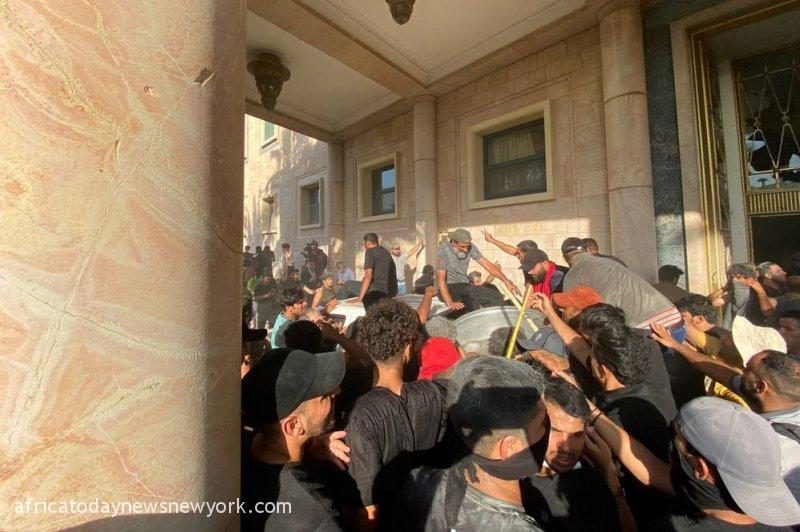Reports reaching Africa Today News, New York have it that as fighting between Iraqi security forces and proponents of an influential Shia cleric persisted in Baghdad throughout the night, at least 15 individuals were killed.
Following Muqtada al-supporters Sadr’s storming the presidential palace, authorities said that several more individuals suffered injuries.
With Mr. Sadr’s announcement of his political retirement, violence broke out, causing mayhem in the locality.
Following disturbances in numerous other cities, Iraq’s interim prime minister has appealed for tranquility and the military has imposed a national curfew.
Among the bloodiest violence to shake the Iraqi capital in recent years broke out overnight as fighters traded gunshots and tracer bullets lit up the night sky.
Read Also: Biden, Iraqi PM Discuss Recent Embassy Rocket Strikes
The Green Zone of the city, which is home to both government facilities and international embassies, has been the center of the conflict.
According to security personnel, some of the feudings were between the Iraqi military and the Peace Brigades, a militia that supports Mr. Sadr. Videos posted to social media seemed to show a few combatants using powerful weapons, such as rocket-propelled grenades (RPGs).
Amid the fighting, Iran has sealed its borders with Iraq, and Kuwait as a matter of concern has ordered its citizens to evacuate the country urgently.
According to the AFP news agency, doctors stated that 15 of Mr. Sadr’s followers had been killed by gunfire and about 350 other protestors had been wounded.
In response to the current scenario, UN Secretary-General Antonio Guterres urged for “immediate steps to de-escalate the situation” this was related to the public through a spokesperson.
Additionally, Mustafa al-Kadhimi, the acting prime minister and a supporter of Mr. Sadr, has postponed cabinet sessions and begged the powerful cleric to step in and bring a stop to the bloodshed.
Mr. Sadr had declared a hunger strike until the use of aggression and weapons ceased, a senior assistant to him subsequently informed Iraq’s state news agency INA.
It came after a day of unrest caused by Mr. Sadr’s statement that he was resigning from politics, a decision he attributed to rival Shia leaders and parties’ opposition to reforming the Iraqi political system.
The majority of seats in Iraq’s parliament were won by candidates loyal to Mr. Sadr in October, but he was unable to garner enough support to establish a government. Since then, he has steadfastly refused to deal with Shia organizations supported by Iran, leading to over a year of political unrest.
Mr. Sadr said: ‘I had decided not to interfere in political affairs, but I now announce my final retirement and the closure of all [Sadrist] institutions.’ Some religious sites linked to his movement will remain open.
For the past 20 years, Mr. Sadr, 48, has dominated Iraqi public and political life. After the war that ousted Saddam Hussein, his Mehdi Army surfaced as one of the most potent militias that battled US and allied Iraqi government forces.
Later, he changed its name to the Peace Brigades, and it is still one of the largest militias that are now a member of the Iraqi military.
Despite having ties with Iran through the Mehdi Army, Mr. Sadr has since distanced himself from Iraq’s Shia neighbor and recast himself as a nationalist who seeks to stop US and Iranian meddling in the country’s domestic affairs.
The Coordination Framework, a competing Shia political coalition, has been at odds with Mr. Sadr’s bloc and is primarily composed of organizations with Iranian support.
With his black turban, dark eyes, and bulky physique, Mr. Sadr, one of Iraq’s most recognizable characters, has stood out for common Iraqis who were suffering from high unemployment, frequent power outages, and corruption.
He is one of the select few individuals capable of drawing down hundreds of thousands of fans after immediately mobilizing them onto the streets. Since being stormed twice in protest of the impasse in July and August, hundreds have erected a camp outside of the parliament.
